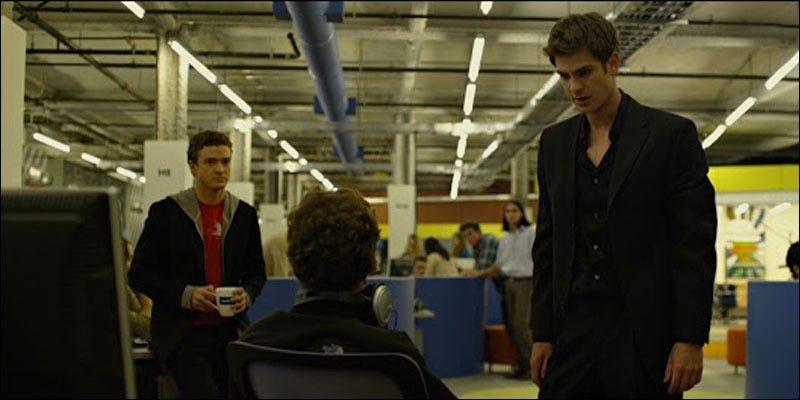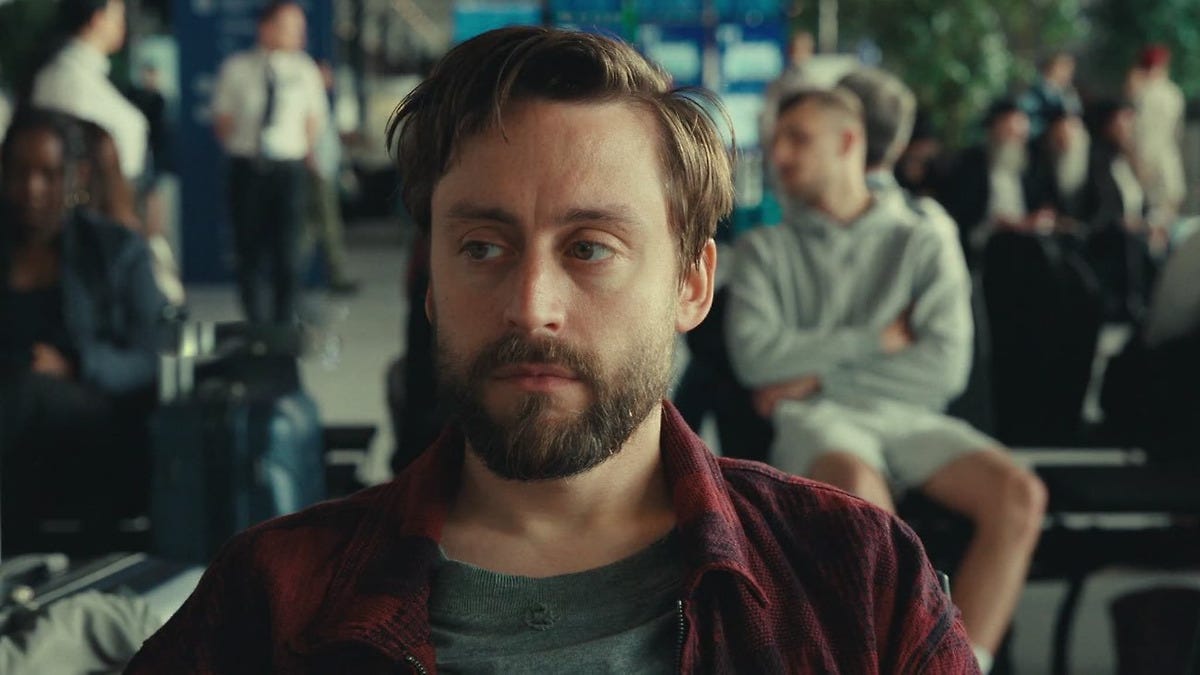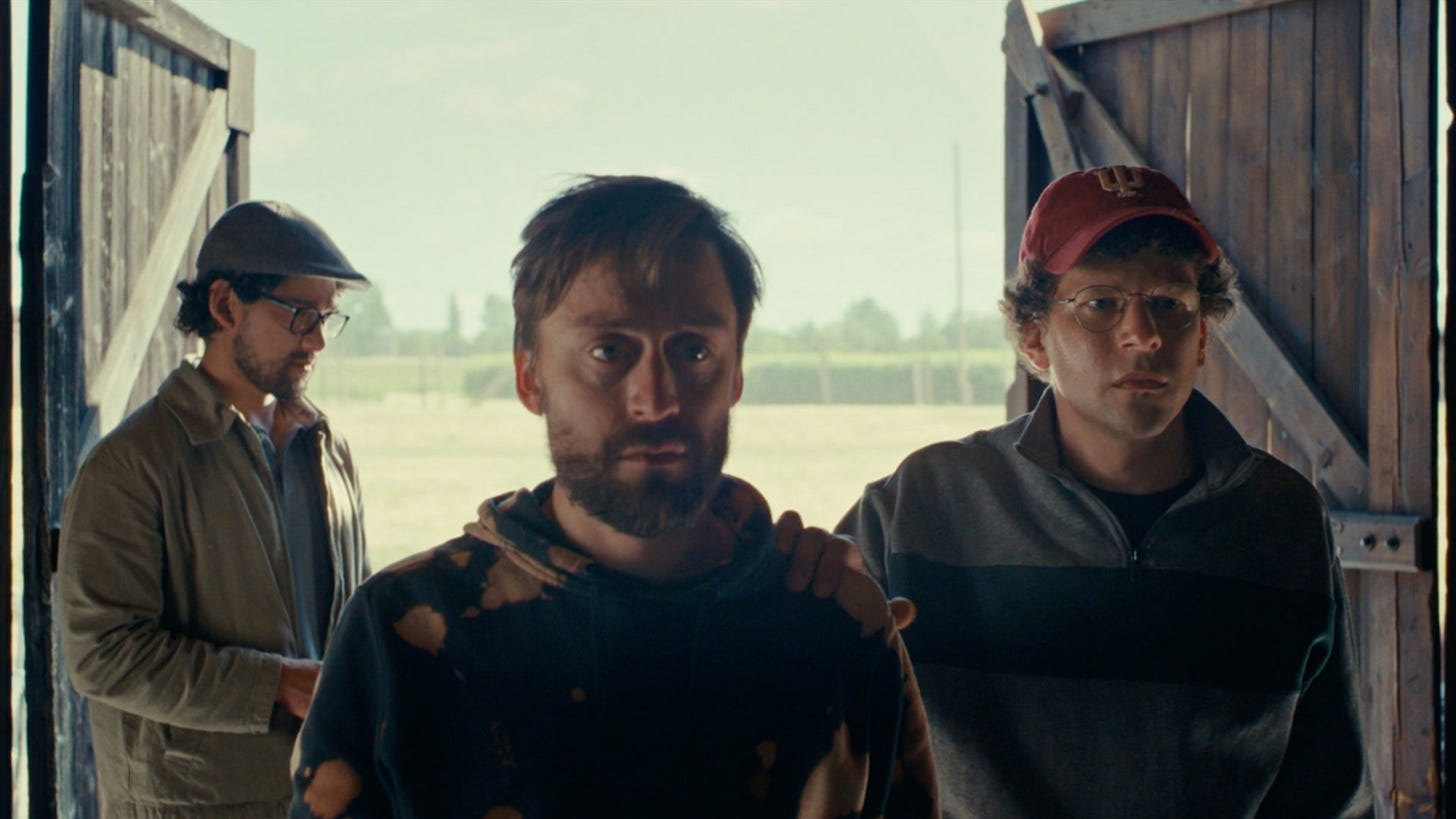'A Real Pain' Review
Some thoughts on Jesse Eisenberg's second feature after watching it at NYFF
“I know pain is unexceptional, so I don't burden everyone with it."
I was so, so lucky to be able to see Jesse Eisenberg’s second feature, A Real Pain, at the New York Film Festival this past weekend, along with a Q&A featuring Eisenberg as well as some of the cast and producers.
It’s no secret to anyone that this was my most anticipated movie of the year, and I jumped at the chance to see it before its wider release. I’m a huge fan of both Jesse Eisenberg and Kieran Culkin, so the two of them coming together for this movie was a bit of a dream come true for me. With all my extremely high expectations going into this movie, it lived up to every single one. In fact, I would go so far as to say that it exceeded many of them. Jesse Eisenberg’s screenplay manages to hit just the right blend of genuine, laugh-out-loud humor with hard-hitting emotional moments and questions that pack a real punch.
The movie follows two Jewish cousins, David (Jesse Eisenberg) and Benji (Kieran Culkin) who have drifted apart but come back together to travel to Poland in honor of their grandmother, a Holocaust survivor who has recently passed away. They participate in a tour group consisting of a few fellow tourists and their guide, James (Will Sharpe), taking them on an emotional journey through both their personal and collective history.
Jesse Eisenberg is a great director, but he is a phenomenal writer. His first feature film, When You Finish Saving the World, which premiered in 2022, received what I would describe as a mixed to negative response. However, I’ll take this moment to be a staunch defender of that movie, and particularly its screenplay. Its strongest quality, in my opinion, is the character work. Personally, I often find myself coming out of movies, even ones I really love, with my biggest critique being that the characters felt flat. And I’ll say it: it’s actually extremely difficult to create characters that feel real and fleshed out when you only have somewhere from an hour and a half to 3 hours with them. That’s why a lot of my favorite characters come from TV shows and franchises — because you get to spend more time with them, and they are allowed to be fleshed out gradually and fully. However, with When You Finish Saving the World and now even more so with A Real Pain, Eisenberg has established himself as a master of creating some beautifully complex and fully developed characters, which is even more impressive when you consider that both films have a runtime of about 90 minutes.
Of course, a lot of credit has to go to the actors for that as well. Good writing with a lacking performance still creates a flat character. In the case of When You Finish Saving the World, having Julianne Moore and Finn Wolfhard step into these roles definitely brings it to the next level. As for A Real Pain, the majority of the credit on that end goes to Kieran Culkin, as well as Eisenberg himself.
Kieran Culkin has been getting a lot of praise and discussion surrounding his role as Benji, which is totally deserved. His performance may very well be the thing that elevates this from a great movie to a phenomenal one. With that being said, I also have to acknowledge Eisenberg’s acting performance in this movie. He is of course getting his well-deserved time in the spotlight for his writing and directing, but I want to talk about his performance. As someone who started this review by proclaiming myself as a Jesse Eisenberg fan, that starts with his performance in movies such as Zombieland, Now You See Me, and, of course, The Social Network (which is one of if not my favorite movie). There’s an interesting pattern that continues with the reception of A Real Pain, which is that his talent as an actor often seems to be overshadowed by the praise directed toward his co-stars. I think this is because he tends to play roles that are very precise, but often somewhat more quiet and subdued than their counterparts, and the power of those kinds of performances can unfortunately go unrecognized.
Of course, my major example here is David Fincher’s The Social Network. Andrew Garfield gets a lot of the credit here, rightfully so, but this movie quite simply does not work without Eisenberg’s masterful performance as Mark Zuckerberg. Aaron Sorkin’s screenplay for this movie is the perfect vessel for Eisenberg to showcase his talent, and he absolutely does.
Something similar happens with A Real Pain. Culkin’s character, Benji, is by far the more outspoken of the two. He is very animated, with an overwhelming energy that takes over any space he enters (which is a crucial part of his character that plays into this movie in a big way). Eisenberg’s character, David, is the cousin of Culkin’s character. He is much more pulled back, and he is often hesitant to make his voice heard in any situation. This dynamic between the two characters works flawlessly, as they push and pull and grate on each other while also displaying the real emotional ordeal that comes with having such a complicated relationship with a family member. This movie would not work without that dynamic, and a lot of that tension hits an emotional climax with a monologue that Eisenberg delivers beautifully about two thirds of the way through the movie.
My absolute favorite moment in this movie, which totally seals the deal on everything it accomplishes from a character work standpoint, is a rooftop conversation that David and Benji have towards the end of the movie. After spending the better part of a week together following a long period of time during which they drifted apart and didn’t see each other so much, it becomes increasingly apparent that David’s frustrations with Benji are pushing him to his limit. It’s a real, emotionally resonant look at what it feels like to have a family member who you love so much, but who can also be incredibly difficult and draining. Combined with some sad information we receive about Benji’s past in a really poignant moment in the film (which was a heartbreaking but incredibly well executed addition to the story), this is what shapes their dynamic as cousins. David is feeling that all too much, and it sort of spills out of him in this very emotionally raw moment between the cousins.
This whole moment comes down to the complexity of Benji’s character. I know this has become a bit of a cliché in film reviews, but I don’t know that I’ve ever meant it as genuinely as I do in this circumstance: I cannot imagine anyone else playing this role. This whole movie falls apart if you don’t get Benji exactly right, and there is truly no one better suited than Kieran Culkin to do it. Benji’s whole thing is that he is charming (almost infuriatingly so to David, who wishes he could have that effortless charm) until he really isn’t. He doesn’t censor himself the way that he maybe should, and he says exactly what’s on his mind with little to no regard for how people will respond. But he also makes people feel seen, and he creates a space that invites people to feel what they feel. He has to be the perfect blend of lovable, exhausting, funny, childish, painfully honest, and emotionally vulnerable. That’s Kieran Culkin’s sweet spot. David is simultaneously jealous of his effortless energy and infuriated by his uncensored and often cutting honesty. Summed up by possibly my favorite line in the movie, where David says, “you light up a room and then you, like, shit on everything inside it.”
The other cast members of this movie are giving stellar performances, too — particularly Jennifer Grey and Will Sharpe, who really help to round out this ensemble of characters and ensure that the nuance extends beyond just the two cousins.
Jesse Eisenberg brings a lot of his own personal and family history to this movie, and you can tell even as you’re watching it through the amount of care and attention that he has put into it. The well-placed humor of the film does not undercut or take away from the very real and devastating impact of its heavier emotional moments. A lot of that comes from the cinematography and editing. There’s a nice balance between moments that are underscored with dialogue compared to moments that are allowed to exist as just visuals, independent of any sound. There’s a delicate touch to the way Eisenberg directs this movie, and I think that’s exactly what was needed. If you do too much here, it loses its authenticity.
The way that this movie explores the personal histories of the cousins coupled with both their grandmother’s history and the wider history of Jewish experiences in Poland is very layered and nuanced, again due in large part to Eisenberg’s phenomenal screenplay and the way he pulls from his own personal family history and experiences.
This movie had a lot of emotional ground it wanted to cover in only its 90 minute runtime, and I think a less skilled filmmaker would not have been able to make it all land. On top of that, finding space for moments of joy and humor that didn’t overwhelm but rather added to and supported the overall tone could have also proven a challenge if it wasn’t approached the way it so clearly was. It’s a movie that is beautiful particularly in its simplicity, with Eisenberg knowing exactly when to really push an emotional beat with the dialogue and when to scale back and let images and expressions speak for themselves. The very last shot of this movie — which you’ll understand if you decide to watch it (you should) — is such a simple yet powerful moment that has been stuck in my mind since I saw it. I think the whole idea of “simple yet powerful” is the balance that this movie nails, and it proves to be an emotional watch for anyone who lets themselves just sit and experience it all and not fight the many things it makes you feel.
I’ll leave you with this: go see A Real Pain in theaters starting on November 1st! Please don’t miss out on this one. It’s really something special.











